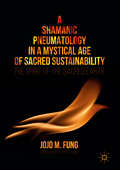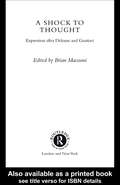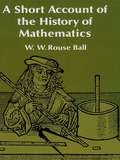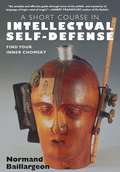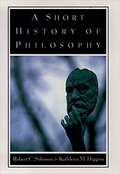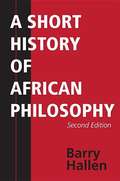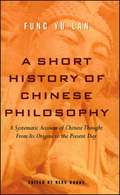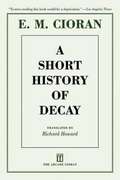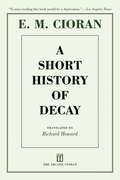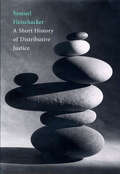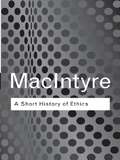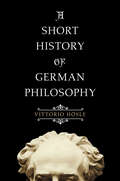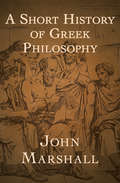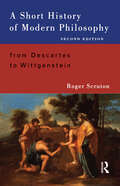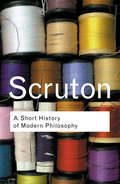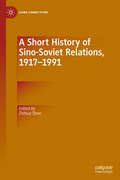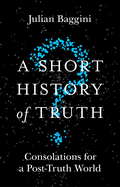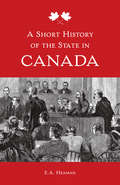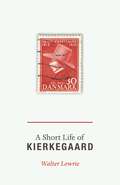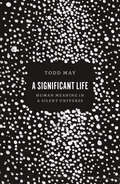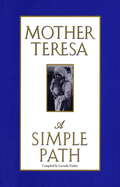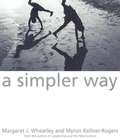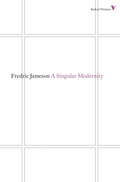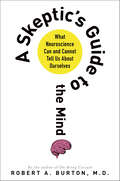- Table View
- List View
A Shamanic Pneumatology in a Mystical Age of Sacred Sustainability: The Spirit of the Sacred Earth
by Jojo M. FungThis book represents a germinal effort that urges all religious and world leaders to savor the mystical spirituality, especially the cosmology and spirituality of sacred sustainability of the indigenous peoples. The power of indigenous spirit world is harnessed for the common good of the indigenous communities and the regenerative power of mother earth. This everyday mysticism of the world as spirited and sacred serves to re-enchant a world disillusioned by the unsustainability of destructive economic systems that have spawned the current ecological crises. Author Jojo Fung offers insight from his lived-experience and this book represents his effort to correlate the indigenous spirit world with Catholic Pneumatology and articulate the activity of God’s Spirit as the Spirit of Sacred Sustainability.
A Shock to Thought: Expression after Deleuze and Guattari (Philosophy And Cultural Studies)
by Brian MassumiA Shock to Thought brings together essays that explore Deleuze and Guattari's philosophy of expression in a number of contemporary contexts. It will be of interest to all those in philosophy, cultural studies and art theory. The volume also contains an interview with Guattari which clearly restates the 'aesthetic paradigm' that organizes both his and Deleuze's work.
A Short Account of the History of Mathematics (Dover Books on Mathematics)
by W. W. BallThis is a new printing, the first inexpensive one, of one of the most honored histories of mathematics of all time. When the last revised edition appeared in 1908, it was hailed by mathematicians and laymen alike, and it remains one of the clearest, most authoritative, and most accurate works in the field. Mathematicians welcomed it as a lucid overview of the development of mathematics down through the centuries. Laymen welcomed it as a work which gave them an opportunity to understand the development of one of the most recondite and difficult of all intellectual endeavors, and the individual contributions of its great men.In this standard work, Dr. Ball treats hundreds of figures and schools that have been instrumental in the development of mathematics from the Egyptians and Phoenicians to such giants of the 19th century as Grassman, Hermite, Galois, Lie, Riemann, and many others who established modern mathematics as we know it today. This semi-biographical approach gives you a real sense of mathematics as a living science, but where Dr. Ball has found that the biographical approach is not sufficient or suited to presenting a mathematical discovery or development, he does not hesitate to depart from his major scheme and treat the mathematics in detail by itself. Thus, while the book is virtually a pocket encyclopedia of the major figures of mathematics and their discoveries, it is also one of the best possible sources for material on such topics as the problems faced by Greek mathematicians, the contributions of the Arab mathematicians, the development of mathematical symbolism, and the invention of the calculus.While some background in mathematics is desirable to follow the reference in some of the later sections, most of the book can be read without any more preparation than high school algebra. As a history of mathematics to browse through, or as a convenient reference work, it has never been excelled.
A Short Course in Intellectual Self Defense: Find Your Inner Chomsky
by Andrea Schmidt Normand Baillargeon CharbWhat is the relationship between democracy and critical thinking? What must a citizen in a democracy know to make the word democracy meaningful? In A Short Course in Intellectual Self-Defense, historian and educator Normand Baillargeon provides readers with the tools to see through the spin and jargon of everyday politics and news reporting in order to decide for themselves what is at stake and how to ask the necessary questions to protect themselves from the manipulations of the government and the media. Whether the issue be the call to what we're told will be a bloodless war, the "debate" around Intelligent Design, or the meaning of a military expenditure, Baillargeon teaches readers to evaluate information and sort fact from official and media spin.
A Short History Of Philosophy
by Robert C. Solomon Kathleen M. HigginsPhilosophy is a singularly expansive enterprise, a fascinating outgrowth of a human nature that demands we question who and why we are. In A Short History of Philosophy , the most accessible concise portrait of philosophy in seventy years, Robert Solomon and Kathleen Higgins meet the challenge of accurately and engagingly describing it all, revelling in philosophy as "the art of wonder," the search for meaning, a gripping, dramatic endeavor. Here is the entire history of philosophy--ancient, medieval, and modern, from cultures both East and West--described in its historical and cultural context. "The concepts that lie at the heart of philosophy antedate history by thousands of years," the authors write in their introduction, noting that the ancient concept of immortality, prehistorical ideas about magic, and the complex set of beliefs implied by the practice of human sacrifice all exhibit philosophic underpinnings. Solomon and Higgins chart the profound development of philosophical thought around the world and through the centuries from the first stirrings of speculation and wonder to the rise of distinct (and often antithetical) philosophical traditions, moral constructs, and religious practices. From the early Greek and Asian philosophers and the mythological traditions that preceded them, to the great Greek, Indic, and Chinese philosophers, to the drama of the great religious philosophies, the authors have spun a marvelous tale that leads to the development and decline of modernity. Along with the major characters, such as Aristotle, Kant, and Confucius, Solomon and Higgins draw engaging portraits of less well-known alchemists, mystics, rebels, eccentrics of all sorts, including figures often ignored in philosophy--figures such as Teresa of Avila, who contributed to the mystical traditions of Catholicism; al-Razi, a contrarian Persian philosopher within the Arabic tradition who described the philosophical life as "godlike;" and Erasmus, the Dutch philosopher who parodied the foolishness of man in his praise of folly. With a clear, witty style and a flair for making complex ideas accessible, the authors also convincingly demonstrate the relevance of philosophy to our times, emphasizing the legacy of the revolutions wrought by science, industry, colonialism, and sectarian warfare, and the philosophical responses to the traumas of the twentieth century (including two world wars and the Holocaust): existentialism, positivism, postmodernism, feminism, and multiculturalism among them. But Solomon and Higgins go beyond merely retelling the rich history of philosophy; the authors provide their own twists and interpretations of events, resulting in a story that reveals the continuing complexity and diversity of a richly textured and nuanced intellectual tradition. All who are "lovers of wisdom" will find much to reward them in this book.
A Short History of African Philosophy (Second Edition)
by Barry HallenA Short History of African Philosophy discusses major ideas, figures, and schools of thought in philosophy in the African context. While drawing out critical issues in the formation of African philosophy, Barry Hallen focuses on recent scholarship and relevant debates that have made African philosophy critical to understanding the rich and complex cultural heritage of the continent. This revised edition expands the historical perspective, takes account of recent discoveries and new canonical figures, highlights new discussions about gender as a cultural and philosophical phenomenon, clarifies issues regarding indigenous cultures and human rights, and builds on the notion that African philosophy shares methods and concerns of philosophy worldwide. This short reference is an essential resource for students, scholars, and general readers.
A Short History of Chinese Philosophy
by Yu-lan FungThe classic chronicle of Chinese philosophical thought from the third millennium to the 20th century.From the sage-kings of ancient China to the 1911 overthrow of the oldest monarchical system in the world, Chinese philosophy has evolved and influenced schools of thought around the world. In an accessible voice, A Short History of Chinese Philosophy clearly illuminates Confucianism, Taoism, Mohism, Yin-Yang, and more. For those interested in philosophy or Asian studies, this is the perfect window into ancient and modern Chinese ideology.
A Short History of Decay
by Richard Howard E. M. Cioran Eugene ThackerE. M. Cioran confronts the place of today's world in the context of human history--focusing on such major issues of the twentieth century as human progress, fanaticism, and science--in this nihilistic and witty collection of aphoristic essays concerning the nature of civilization in mid-twentieth-century Europe. <P><P>Touching upon Man's need to worship, the feebleness of God, the downfall of the Ancient Greeks and the melancholy baseness of all existence, Cioran's pieces are pessimistic in the extreme, but also display a beautiful certainty that renders them delicate, vivid, and memorable. Illuminating and brutally honest, A Short History of Decay dissects Man's decadence in a remarkable series of moving and beautiful pieces.
A Short History of Decay
by E. M. Cioran Eugene ThackerE. M. Cioran confronts the place of today's world in the context of human history-focusing on such major issues of the twentieth century as human progress, fanaticism, and science-in this nihilistic and witty collection of aphoristic essays concerning the nature of civilization in mid-twentieth-century Europe. Touching upon Man's need to worship, the feebleness of God, the downfall of the Ancient Greeks and the melancholy baseness of all existence, Cioran's pieces are pessimistic in the extreme, but also display a beautiful certainty that renders them delicate, vivid, and memorable. Illuminating and brutally honest, A Short History of Decay dissects Man's decadence in a remarkable series of moving and beautiful pieces.
A Short History of Distributive Justice
by Samuel FleischackerDistributive justice in its modern sense calls on the state to guarantee that everyone is supplied with a certain level of material means. Samuel Fleischacker argues that guaranteeing aid to the poor is a modern idea, developed only in the last two centuries. Earlier notions of justice, including Aristotle's, were concerned with the distribution of political office, not of property. It was only in the eighteenth century, in the work of philosophers such as Adam Smith and Immanuel Kant, that justice began to be applied to the problem of poverty. To attribute a longer pedigree to distributive justice is to fail to distinguish between justice and charity. Fleischacker explains how confusing these principles has created misconceptions about the historical development of the welfare state. Socialists, for instance, often claim that modern economics obliterated ancient ideals of equality and social justice. Free-market promoters agree but applaud the apparent triumph of skepticism and social-scientific rigor. Both interpretations overlook the gradual changes in thinking that yielded our current assumption that justice calls for everyone, if possible, to be lifted out of poverty. By examining major writings in ancient, medieval, and modern political philosophy, Fleischacker shows how we arrived at the contemporary meaning of distributive justice.
A Short History of Ethics: A History of Moral Philosophy from the Homeric Age to the 20th Century (Routledge Classics)
by Alasdair MacIntyreA Short History of Ethics has over the past thirty years become a key philosophical contribution to studies on morality and ethics. Alasdair MacIntyre writes a new preface for this second edition which looks at the book 'thirty years on' and considers its impact. A Short History of Ethics guides the reader through the history of moral philosophy from the Greeks to contemporary times. MacIntyre emphasises the importance of a historical context to moral concepts and ideas showing the relevance of philosophical queries on moral concepts and the importance of a historical account of ethics. A Short History of Ethics is an important contribution written by one of the most important living philosophers. Ideal for all philosophy students interested in ethics and morality.
A Short History of German Philosophy
by Steven Rendall Vittorio HösleThis concise but comprehensive book provides an original history of German-language philosophy from the Middle Ages to today. In an accessible narrative that explains complex ideas in clear language, Vittorio Hösle traces the evolution of German philosophy and describes its central influence on other aspects of German culture, including literature, politics, and science. Starting with the medieval mystic Meister Eckhart, the book addresses the philosophical changes brought about by Luther's Reformation, and then presents a detailed account of the classical age of German philosophy, including the work of Leibniz and Kant; the rise of a new form of humanities in Lessing, Hamann, Herder, and Schiller; the early Romantics; and the Idealists Fichte, Schelling, and Hegel. The following chapters investigate the collapse of the German synthesis in Schopenhauer, Feuerbach, Marx, and Nietzsche. Turning to the twentieth century, the book explores the rise of analytical philosophy in Frege and the Vienna and Berlin circles; the foundation of the historical sciences in Neo-Kantianism and Dilthey; Husserl's phenomenology and its radical alteration by Heidegger; the Nazi philosophers Gehlen and Schmitt; and the main West German philosophers, including Gadamer, Jonas, and those of the two Frankfurt schools. Arguing that there was a distinctive German philosophical tradition from the mid-eighteenth century to the mid-twentieth century, the book closes by examining why that tradition largely ended in the decades after World War II.A philosophical history remarkable for its scope, brevity, and lucidity, this is an invaluable book for students of philosophy and anyone interested in German intellectual and cultural history.
A Short History of Greek Philosophy
by John MarshallAn overview of the works that form the foundation of Western philosophy The writings of Socrates, Plato, and Aristotle have resonated through the millennia and continue to influence the lives of people today. In A Short History of Greek Philosophy, renowned British classicist John Marshall provides a thorough yet engaging account of the seminal philosophical movements of ancient Greece, from the Sophists to the Sceptics to the Stoics. For readers looking to dip their toes into the vast ocean of Western philosophy, Marshall&’s history provides the perfect springboard. This ebook has been professionally proofread to ensure accuracy and readability on all devices.
A Short History of Modern Philosophy: From Descartes to Wittgenstein (Routledge Classics Ser.)
by Roger ScrutonA Short History of Modern Philosophy is a lucid, challenging and up-to-date survey of the philosophers and philosophies from the founding father of modern philosophy, René Descartes, to the most important and famous philosopher of the twentieth century, Ludwig Wittgenstein. Roger Scruton has been widely praised for his success in making the history of modern philosophy cogent and intelligible to anyone wishing to understand this fascinating subject. In this new edition, he has responded to the explosion of interest in the history of philosophy by substantially rewriting the book, taking account of recent debates and scholarship.
A Short History of Modern Philosophy: From Descartes to Wittgenstein (Routledge Classics)
by Roger ScrutonDiscover for yourself the pleasures of philosophy! Written both for the seasoned student of philosophy as well as the general reader, the renowned writer Roger Scruton provides a survey of modern philosophy. Always engaging, Scruton takes us on a fascinating tour of the subject, from founding father Descartes to the most important and famous philosopher of the twentieth century, Ludwig Wittgenstein. He identifies all the principal figures as well as outlines of the main intellectual preoccupations that have informed western philosophy. Painting a portrait of modern philosophy that is vivid and animated, Scruton introduces us to some of the greatest philosophical problems invented in this period and pursued ever since. Including material on recent debates, A Short History of Modern Philosophy is already established as the classic introduction. Read it and find out why.
A Short History of Sino-Soviet Relations, 1917–1991 (China Connections)
by Zhihua ShenDrawing on the rich trove of recently declassified Russian and Chinese archival materials, this history of Sino-Soviet relations in the 20th century sheds new light on key events during this period. It offers fresh insights into the role of ideology and national interests in the evolution of the complex and turbulent relationship between not just the two countries but also their respective Communist Parties. The chapters on the normalization of bilateral ties provide an in-depth analysis of divisions in the socialist camp that culminated in both its collapse and the disintegration of the Soviet Union. The book argues that 20th century Sino-Soviet relations reflected both long-standing and emerging political and geopolitical challenges facing members of the Cold War socialist camp, in particular tensions between the ideal of internationalism and national aspirations, between commitment to the principle of sovereignty and commitment to that of equality in international relations, and between inter-party relations and inter-state relations. This makes for a valuable addition to the reading lists of all those interested in the development of the relationship between two of the world’s most important countries.
A Short History of Truth: Consolations For A Post-truth World
by Julian BagginiHow did we find ourselves in a "post-truth" world of "alternative facts"? And can we get out of it? A Short History of Truth sets out to answer these questions by looking at the complex history of truth and falsehood. It identifies ten types of supposed truth and explains how easily each can become the midwife of falsehood. There is no species of truth that we can rely on unquestioningly, but that does not mean the truth can never be established. Attaining truth is an achievement we need to work for, and each chapter will end up with a truth we can have some confidence in.This history builds into a comprehensive and clear explanation of why truth is now so disputed by exploring 10 kinds of truth:1. Eternal truths.2. Authoritative truths.3. Esoteric truths.4. Reasoned truths.5. Evidence-based truths.6. Creative truths.7. Relative truths. 8. Powerful truths9. Moral truths.10. Holistic truths. Baggini provides us with all we need to restore faith in the value and possibility of truth as a social enterprise. Truth-seekers need to be sceptical not cynical, autonomous not atomistic, provisional not dogmatic, open not empty, demanding not unreasonable.
A Short History of Truth: Consolations for a Post-Truth World
by Julian BagginiHow did we find ourselves in a "post-truth" world of "alternative facts"? And can we get out of it? A Short History of Truth sets out to answer these questions by looking at the complex history of truth and falsehood. It identifies ten types of supposed truth and explains how easily each can become the midwife of falsehood. There is no species of truth that we can rely on unquestioningly, but that does not mean the truth can never be established. Attaining truth is an achievement we need to work for, and each chapter will end up with a truth we can have some confidence in.This history builds into a comprehensive and clear explanation of why truth is now so disputed by exploring 10 kinds of truth:1. Eternal truths.2. Authoritative truths.3. Esoteric truths.4. Reasoned truths.5. Evidence-based truths.6. Creative truths.7. Relative truths. 8. Powerful truths9. Moral truths.10. Holistic truths. Baggini provides us with all we need to restore faith in the value and possibility of truth as a social enterprise. Truth-seekers need to be sceptical not cynical, autonomous not atomistic, provisional not dogmatic, open not empty, demanding not unreasonable.
A Short History of the State in Canada
by E. A. HeamanA concise, elegant survey of a complex aspect of Canadian history, A Short History of the State in Canada examines the theory and reality of governance within Canada's distinctive political heritage: a combination of Indigenous, French, and British traditions, American statism and anti-statism, and diverse, practical experiments and experiences.E.A. Heaman takes the reader through the development of the state in both principle and practice, examining Indigenous forms of government before European contact; the interplay of French and British colonial institutions before and after the Conquest of New France; the creation of the nineteenth-century liberal state; and, finally, the rise and reconstitution of the modern social welfare state. Moving beyond the history of institutions to include the development of political cultures and social politics, A Short History of the State in Canada is a valuable introduction to the topic for political scientists, historians, and anyone interested in Canada's past and present.
A Short Life of Kierkegaard
by Walter LowrieA small, insignificant-looking intellectual with absurdly long legs, Søren Kierkegaard (1813-1855) was a veritable Hans Christian Andersen caricature of a man. A strange combination of witty cosmopolite and melancholy introvert, he spent years writing under a series of fantastical pseudonyms, lavishing all the splendor of his magnificent mind on a seldom-appreciative world. He had a tragic love affair with a young girl, was dominated by an unforgettable Old Testament father, fought a sensational literary duel with a popular satiric magazine, and died in the midst of a violent quarrel with the state church for which he had once studied theology. Yet this iconoclast produced a number of brilliant books that have profoundly influenced modern thought. In this classic biography, the celebrated Kierkegaard translator Walter Lowrie presents a charming and warmly appreciative introduction to the life and work of the great Danish writer. Lowrie tells the story of Kierkegaard's emotionally turbulent life with a keen sense of drama and an acute understanding of how his life shaped his thought. The result is a wonderfully informative and entertaining portrait of one of the most important thinkers of the past two centuries. This edition also includes Lowrie's wry essay "How Kierkegaard Got into English," which tells the improbable story of how Lowrie became one of Kierkegaard's principal English translators despite not learning Danish until he was in his 60s, as well as a new introduction by Kierkegaard scholar Alastair Hannay.
A Significant Life: Human Meaning in a Silent Universe
by Todd MayWhat makes for a good life, or a beautiful one, or, perhaps most important, a meaningful one? Throughout history most of us have looked to our faith, our relationships, or our deeds for the answer. But in A Significant Life, philosopher Todd May offers an exhilarating new way of thinking about these questions, one deeply attuned to life as it actually is: a work in progress, a journey--and often a narrative. Offering moving accounts of his own life and memories alongside rich engagements with philosophers from Aristotle to Heidegger, he shows us where to find the significance of our lives: in the way we live them. May starts by looking at the fundamental fact that life unfolds over time, and as it does so, it begins to develop certain qualities, certain themes. Our lives can be marked by intensity, curiosity, perseverance, or many other qualities that become guiding narrative values. These values lend meanings to our lives that are distinct from--but also interact with--the universal values we are taught to cultivate, such as goodness or happiness. Offering a fascinating examination of a broad range of figures--from music icon Jimi Hendrix to civil rights leader Fannie Lou Hamer, from cyclist Lance Armstrong to The Portrait of a Lady's Ralph Touchett to Claus von Stauffenberg, a German officer who tried to assassinate Hitler--May shows that narrative values offer a rich variety of criteria by which to assess a life, specific to each of us and yet widely available. They offer us a way of reading ourselves, who we are, and who we might like to be. Clearly and eloquently written, A Significant Life is a recognition and a comfort, a celebration of the deeply human narrative impulse by which we make--even if we don't realize it--meaning for ourselves. It offers a refreshing way to think of an age-old question, of quite simply, what makes a life worth living.
A Simple Path
by Mother TeresaKnown around the globe for her indefatigable work on behalf of the poor, the sick, and the dying, Mother Teresa has devoted her life to giving hope to the hopeless in more than one hundred and twenty countries. She inspires us all to find a way to translate our spiritual beliefs into action in the world. How has one woman accomplished so much? And what are the guiding principles that have enabled this humble nun to so profoundly effect the lives of millions? Now, in her own words, Mother Teresa shares the thoughts and experiences that have led her to do her extraordinary charitable work. A candid look at her everyday life--at the very simplicity and self-sacrifice that give her the strength to move mountains--A Simple Path gives voice to the remarkable spirit who has dedicated her life to the poorest among us. Just as important as her beliefs are how they are put into action in the world, and A Simple Path also tells the story of the founding of the Missionaries of Charity, their purpose and practice, and the results of their tireless work. Through faith, surrender, and prayer, the missionaries live to serve others; they have improved the lives of countless souls and given dignity to the dying. Their mission has also produced a ripple effect, spreading human compassion to communities where there is need. Through these examples, as well as the uplifting words and guiding prayers of Mother Teresa and those who work with her, everyone can learn how to walk the simple path that Mother Teresa has laid out for us, to help create a truly kinder world for the future. A Simple Path is a unique spiritual guide for Catholics and non-Catholics alike: full of wisdom and hope from the one person who has given us the greatest model of love in action in our time.
A Simpler Way
by Margaret J. Wheatley Myron Kellner-RogersWe want life to be less arduous and more delightful. We want to be able to think differently about how to organize human activities. Our book springs from these desires. It explores a different way of thinking about life and about how organizing might occur. Our primary question is: How could we organize human endeavor if we developed different understandings of how life organizes itself? We ask this question for all of us, for there is no one who is unaffected by the organizations we humans have created.
A Singular Modernity
by Fredric JamesonThe concepts of modernity and modernism are amongst the most controversial and vigorously debated in contemporary philosophy and cultural theory. In this intervention, Fredric Jameson--perhaps the most influential and persuasive theorist of postmodernity--excavates and explores these notions in a fresh and illuminating manner.The extraordinary revival of discussions of modernity, as well as of new theories of artistic modernism, demands attention in its own right. It seems clear that the (provisional) disappearance of alternatives to capitalism plays its part in the universal attempt to revive 'modernity' as a social ideal. Yet the paradoxes of the concept illustrate its legitimate history and suggest some rules for avoiding its misuse as well.In this major interpretation of the problematic, Jameson concludes that both concepts are tainted, but nonetheless yield clues as to the nature of the phenomena they purported to theorize. His judicious and vigilant probing of both terms--which can probably not be banished at this late date--helps us clarify our present political and artistic situations.From the Trade Paperback edition.
A Skeptic's Guide to the Mind: What Neuroscience Can and Cannot Tell Us About Ourselves
by Robert A. BurtonIn this scientific study, a neurologist presents a critical, startling, and expansive journey into the mysteries of the brain and what makes us human.What if our soundest, most reasonable judgments are beyond our control?Despite 2500 years of contemplation by the world's greatest minds and the more recent phenomenal advances in basic neuroscience, neither neuroscientists nor philosophers have a decent understanding of what the mind is or how it works. The gap between what the brain does and the mind experiences remains uncharted territory. Nevertheless, with powerful new tools such as the fMRI scan, neuroscience has become the de facto mode of explanation of behavior. Neuroscientists tell us why we prefer Coke to Pepsi, and the media trumpets headlines such as “Possible site of free will found in brain.” Or: “Bad behavior down to genes, not poor parenting.”Robert Burton believes that while some neuroscience observations are real advances, others are overreaching, unwarranted, wrong-headed, self-serving, or just plain ridiculous, and often with the potential for catastrophic personal and social consequences. In A Skeptic's Guide to the Mind, he brings together clinical observations, practical thought experiments, personal anecdotes, and cutting-edge neuroscience to decipher what neuroscience can tell us—and where it falls woefully short. At the same time, he offers a new vision of how to think about what the mind might be and how it works.“With a rich tapestry of neurological case studies, allusions to film and literature, compelling personal stories, and challenging thought experiments, Burton describes the abundant philosophical and scientific challenges to the belief that we know―or even that we can know―our own minds.” ―New York Times–bestselling author Daniel Simons
